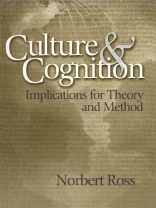‘The subject matter is very timely for such a book. The field of culture and cognition is in a state of considerable flux, and it requires the kind of knowledge that Ross has not only of cognitive anthropology but of cognitive psychology to make a synthesis and to develop guideposts and steer the field towards viable future objectives. Ross possesses complete familiarity with the literature…. This should make for an excellent contribution.’
–Douglas White, Department of Anthropology, University of California, Irvine
‘Norbert Ross is a fine scholar, and the book does something useful and new…. an important contribution by a respected researcher who knows what he is talking about and who has done creative basic work in the field.’
–Roy D′Andrade, Department of Anthropology, University of California, San Diego
‘In view of a current trend to integrate knowledge re ′culture′ and ′cognition′ in psychology (particularly marked) and anthropology, there is a growing demand for good textbooks in these fields. The ideas proposed by Ross are interesting and potentially productive.’
–Chizuko Izawa, Department of Psychology, Tulane University
Culture plays an important role in our everyday lives, yet the study of cultural processes and their impact on thinking and behavior is still in its infancy. Research in anthropology generally lacks the clarity and specificity of cognitive processes and is therefore usually ignored by most psychologists. On the other hand, most cognitive research in psychology either ignores culture as an important factor to be taken into account or treats culture as yet another independent variable.
Recent trends indicate an increasing interest in ‘culture’ as a topic of psychological inquiry. Culture and Cognition: Implications for Theory and Methods combines the study of culture with an understanding of relevant cognitive processes and the challenge of studying high-level cognition as embedded into culture. Author Norbert Ross engages both anthropology and psychology, with the belief that any successful research in culture and cognition must embrace insights from both fields.
Culture and Cognition fills a void in the cross-disciplinary area of culture and cognition by offering a clear overview of approaches from varying disciplinary perspectives, discussing methodological problems as well as theoretical implications of these approaches. The author illustrates real research examples and discusses a specific research strategy that details the necessary methods of data gathering and analysis methods for understanding cross-cultural differences. The book establishes the foundation for sensible cultural and cross-cultural research and provides important insights into both cultural processes in cognition and cognitive aspects of culture.
Recommended for advanced undergraduate and graduate students, scholars, and researchers in the fields of Psychology and Anthropology.
Cuprins
Introduction
1. Culture & Cognition: Ethnography of the Mind – A Cognitive Approach to Culture
2. Cultural Studies & Comparative Design
The Logic of Cultural Studies
Cross-Cultural Studies & Comparative Design
3. Toward a Cognitive Theory of Culture
The Problem with Culture, Folk Beliefs, Scientific Concepts, & their (ab-)use
The Authenticity Crisis of Cultural Concepts: Cultural Differences & Different Cultures
Culture as Socially Transmitted Models
Toward a Cognitive Theory of Culture
The Sharing of Culture & the Exploration of Cultural Differences
Public & Private Culture: The Emergence of Shared Meaning.
4. Research Methods: Data Gathering
The Experimental Design
Scientific Methods & the Role of Participant Observation
Research Design & Field Methods
Experimental Methods in the Field: Data Collection
Cognition & Observational Studies
Social Network Analysis & Informant Agreement.
5. Patterns of Informant Agreement: Some Analytical Implications
Informant Agreement/Disagreement
Adjustment for Guessing. Agreement Pattern & Residual Analysis.
6. Combining Strength: Toward a New Science of Culture
Schemata, Cultural Models, & Consensus
A New Ethnography & an Enhanced Cognitive Science
References
Author Index
Subject Index
Despre autor
Norbert Ross (Ph.D., University of Freiburg, 1998) is at Vanderbilt University. Prior to his current position, he was a research assistant professor at Northwestern University, where he co-founded the Program in Culture, Language and Cognition, a cross-disciplinary program that targets teaching and research. He is Affiliated Researcher at the Program in Cognitive Studies of the Environment (Northwestern University) and the Centro Estudies Indigenas in San Cristobal de Lasa Casas, Mexico. He has taught classes at Northwestern University, the University of Freiburg, the College of the Menominee Nation, and the UNACH (Mexico). Ross’s research focuses on cultural differences, within cultural differences as well as the acquisition of cultural knowledge among children, and he has received several NSF/NIH grants. He has published two books in Germany, including a case study of cognitive aspects of intergenerational change among the Lacandon Maya of Chiapas, Mexico. He is also author and co-author of several research articles in major journals of anthropology, psychology and the general sciences. These include articles in The Proceedings of the National academy of Sciences, Current Anthropology, Human Organization, Cognitive Development, and The Psychology of Learning and Motivation.












